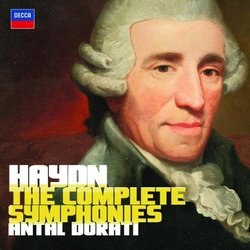| All Artists: Franz Joseph Haydn, Antal Dorati, Philharmonia Hungarica Title: Complete Symphonies (Box) Members Wishing: 1 Total Copies: 0 Label: Decca Original Release Date: 1/1/2009 Re-Release Date: 6/16/2009 Album Type: Box set Genre: Classical Style: Symphonies Number of Discs: 33 SwapaCD Credits: 33 UPC: 028947812210 |
Search - Franz Joseph Haydn, Antal Dorati, Philharmonia Hungarica :: Complete Symphonies (Box)
 | Franz Joseph Haydn, Antal Dorati, Philharmonia Hungarica Complete Symphonies (Box) Genre: Classical Decca has created this complete collection of award winning recordings to celebrate the 200th Anniversary of Haydn's death. Recorded between 1969 and 1972, this was the first complete cycle of Haydn's symphonies. Hungarian... more » |
Larger Image |
CD DetailsSynopsis
Album Description Decca has created this complete collection of award winning recordings to celebrate the 200th Anniversary of Haydn's death. Recorded between 1969 and 1972, this was the first complete cycle of Haydn's symphonies. Hungarian-born Antal Dorati was a Haydn pioneer and specialist who also recorded Haydn operas for Philips during the same period. The Decca catalog of Haydn is without parallel and contains complete cycles of the Piano Sonatas and String Quartets. This is a limited-edition super-budget set. Similar CDs
|
CD ReviewsLEGENDARY, CLASSIC, and MONUMENTAL G. Engler | The Frigid Northeast | 06/27/2009 (5 out of 5 stars) "I own this set in its multi-jewel box, entire shelf length previous incarnation - so I cannot say anything about improvements in remastering. But in terms of the performances, this newest collection of "discs-in-sleeves-at-a-fraction-of-their-original-price" is, argumentatively, the greatest classical music bargain currently on the market. (Note: At amazon's current 07/09 price you are paying approximately $1/disc! Unbelievable!) Dorati was known primarly for his 50s and early 60s recordings on Mercury Living Presence recordings (recordings which stand the test of time well - both in terms of performance, as well as recording sound). By the time he made these recordings, he had well settled into the "second rank" of conductors. Upon the release of these recordings - the first complete cycle of Haydn's symphonic output - Dorati secured his place in the pantheon of notable conductors. This is a cycle for the ages. Never mind that you won't listen to each of the discs in succession (and in fact, you shouldn't) Never mind that you're apt to replay the later symphonies with much more frequency then most of the others (excepting those from the sturm und drang period (you will). This series is the wellspring of classical music. A musical "first lake" that leads to smaller streams, than greater rivers, and eventually leads to the oceans of Mozart and Beethoven. These are the musical source waters containing the rich and fertile nutrients that lead from the Baroque into the great Classical period of music. The joy in listening to this series, is that you can hear Haydn's personal growth throughout these many years. Dorati treats his symphonic oeuvre with much greater respect than most other conductors at the time did. As a result, the great symphonies emerge not as light counterpoint to the later masterpieces, but as significant works in their own right. Papa Haydn - so often, and all too easily dismissed as a Kappellmeister (have you ever heard of a summer "All Haydn" festival?) is revealed as a composer of substance, vitality, and tremendous innovation. That latter point cannot be overemphasized. As a listener who long ago tired of the "original instruments" movement, I simply love the full sonority of Dorati's orchestra and the recordings. The recordings, particularly the strings, sound glorious. These recordings still sound beautiful - whether you are one of those (us?) old enough to remember the richness of Decca / London recordings during the 1970s, or you're a younger listener used to listening on MP3 files on an iPod. Place one of these discs in a fine audio listen and revel in the majestic sound of a full, modern orchestra. It should be noted that there are other cycles that have received laudatory reviews, particularly Fischer's on the mid-priced Brilliant Classics label which I have not heard Haydn: Complete Symphonies (33 CD Box Set). But then again, it is nearly twice the price of this series. Scott Morrison - a deeper, and in all honesty, more knowledgable listener than I has also written an extraordinary review of Naxos set featuring a number of different orchestras. F.J. Haydn: The Complete Symphonies (Box Set) Again, this set is about twice the price of the Dorati. For those who continue to question the need for owning Haydn's complete symphonic output, I point out that Pinnock's Sturm Und Drung symphonies are exemplary, and the original instruments' timbre fit this period quite well - despite my earlier protestations! Haydn: The "Sturm und Drang" Symphonies [Box Set] And then there is Bernstein Leonard Bernstein Conducts Haydn (Box) whose interpreations are vastly underated by the general public these days. Recorded at the peak of his conductorial prowess, Bernstein's performances of Haydn were revelatory, just as his Mahler recordings were. Gone was the dainty Kapellmeister Haydn, replaced by a more passionate and energetic Haydn. Well worth hearing, this set of the Paris and London symphonies (and Masses) is, once again, more expensive than Dorati's complete set. Is there a down side to Dorati's magnum opus? Well, yes. While these performances range from light hearted to the dramatic you will not hear the excitement of discovery present in say, Bernstein. Listen to more than two discs at a time, and you'll likely feel a degree of sameness to the interpretations. On the other hand, Dorati's consistancy - and equal respect for all of the symphonies - is also this set's strength. I truly believe that this set is legendary, and classic. It restored Haydn to his proper place in the recorded pantheon of classic composers. And it continues to sound fresh and vibrant nearly 35 years after its release. It may not be the only Haydn you will listen to, but you will not be deprived if it is. This set remains one of the glories of recorded classical music. 5 stars!" Dorati's Haydn: A Reconsideration Johannes Climacus | Beverly, Massachusetts | 07/31/2009 (5 out of 5 stars) "A couple of years ago I wrote a largely negative review of Dorati's Haydn symphony cycle for this website. In that review, I cited as reasons for my appraisal Dorati's tendency to lumber (particularly in the Menuets) and his Hungarian ensemble's occasional lapses in executional polish. These concerns arose from two auditions of this series--one during the 1970's (when these performances were available in 6-LP volumes on Decca's Stereo Treasury label), and another in the early 1990's (when the cycle was first issued on CD in separate mid-priced boxes of four discs apiece). In honor of the 200th anniversary of the composer's death, when I discovered that Decca/Universal had reissued this monumental set in a super-bargain box at a small fraction of what it cost in previous CD incarnations, I decided to give it another, and, if possible, more appreciative hearing. This time around, while noting the problems that aroused my critical disapprobation previously, I found these performances consistently enjoyable, and indeed far better than most period- or modern-instrument performances that I have encountered in the past two decades or so. Dorati manages to convey the requisite vigor without sacrificing charm. His phrasing is usually shapely (and indeed often ravishingly beautiful in many of the slow movements); his choice of tempi apt (I found the slow Menuets charming this time around--with plenty of time to spare for delicious pointing of detail); and the playing of the Philharmonia Hungarica usually adequate to Haydn's frequently exorbitant demands (the alto horns, in particular, are outstanding in their stratospheric parts, even if the woodwind tuning in general is not always spot-on). In the earliest symphonies, Dorati and his doughty band are clearly on a voyage of discovery, and their enthusiasm is quite contagious. Some of the *Sturm und Drang* Symphonies convey more nervous energy, and sometimes more *Innigkeit* with Scherchen, Janigro, Barenboim and (for period performance practice) the seriously underrated Solomons. Moreover in several of these works Dorati's penchant for slow and stately Menuets is a relative disadvantage (the ones in nos. 44, 46, and 49 really hang fire). Some of the finales, too, could do with more alert playing and dramatic emphasis. Overall, however, Dorati confirms Haydn's inexhaustible invention more often than not in these highly experimental middle-period works. The frothier, more "operatic" symphonies which follow (roughly from 60 onward, with the exception of no. 72, which is actually an early work) are given nicely variegated treatment, even if the capricious humor in some of them is underplayed. Dorati really excels, however, in the slow movements of this group, some of which (such as those from nos. 66, 67, 73-78) count among the most sublime of Haydn's utterances. The more familiar *Paris* group (usually denominated as nos. 82-87, but also including 88-91) receive crisp, lively, dapper readings that rank with the best (Bernstein, Ansermet, Böhm). The great "Oxford" (no. 92), by contrast, is relatively disappointing: Dorati doesn't quite discern its more expansive architecture and emotional ambiguities, nor does he point the humor in the finale quite as effectively as some others. Dorati is at his best in the concluding *London* group, however. Once again, he demonstrates that broadly paced but lilting Menuets can charm the ear more effectively, not least by anticipating the Viennese waltz idiom, than brisk, businesslike one-in-a-bar scherzi. Dorati is particularly good at balancing the orchestral choirs in these often contrapuntally dense works, and I really appreciate the timpanist's use of what sound like hard sticks, enabling his contribution to cut through the texture effectively. Listeners should be aware that this is, I believe, the only "complete" Haydn cycle to include the *Symphonia Concertante* (superbly done), alternate movements of certain symphonies, and textual variants (such as the original version of the *Drumroll*'s Finale). Like Fischer, Dorati also includes the extra-canonical Symphonies "A" and "B", to make this the most complete survey of Haydn's symphonic output on record. The remastered recordings sound fine to my ears, though some listeners (including some who have heard my copy of this set) have complained about dry and aggressive sounding strings. I find the engineering more than acceptable, both in terms of balance and overall orchestral sonority (richer-sounding than a period ensemble, but never too weighty or opaque). In sum, then, my revised estimation of Dorati's Haydn is mostly positive. Comparing his interpretations, and the distinctive sound he evokes form his ensemble, with the interpretations and sonorities on Fischer's rival set (which I also own), I found myself gravitating more toward Dorati's priorities this time around. Fischer captures the experimental qualities in Haydn's invention often more effectively than Dorati, but Dorati evokes what I can only call an old-world geniality (not to be confused with the false image of "Papa Haydn") which satisfies my appetite for graciousness in a world increasingly given to relentless multi-tasking. Younger listeners may not agree: indeed, perhaps my re-evaluation of Dorati's achievement in Haydn signals that I am now "over the hill." But I think this set will appeal to all listeners who want to embark on a thrilling voyage of discovery through one of the great musical achievements in the history of music--and not just to grumpy old men who enjoy life in the slow lane. Strongly recommended to all intrepid explorers." Still the Gold Standard John Van Note | 10/14/2009 (5 out of 5 stars) "With this review, I am taking the liberty of critiquing releases of three complete performances of the Haydn Symphonies:
To undertake a completely recorded set of Haydn's Complete Symphonies is a monumental and ambitious project. To complete it is a monumental accomplishment of having recorded a considerable body of work written by the "father of the symphony," which in itself must provide great relief and satisfaction to all involved upon its completion. Dennis Russell Davies has but three predecessors here: First, the forerunning, pioneer analog set with Antal Dorati conducting the Philharmonia Hungarica and then Adam Fischer digitally recorded the set with the Austro Hungarian Haydn Orchestra in the late 1980s through the early 1990s, first on the Nimbus label, then it was released as a set of its own on Brilliant Classics, then repackaged earlier this year as part of the commemorative Brilliant Classics Haydn Edition (which in spite of its sprawling 150 CDS is not yet "Complete."). And there is a Naxos set which has been released in its separate parts for some time, but has found a recent reissue in a complete boxed set for 2009 for about one hundred dollars, which is not reviewed here. The Dorati set, which after all of these years, I still regard as the gold standard for these performances, is now recently released in its latest budget priced form commemorating the bicentennial of Haydn's death. The orchestra concerned, the Philharmonia Hungarica, was composed of émigrés from the abortive and Soviet suppressed 1956 Hungarian revolt. It is now available in its current version as a cardboard sleeved box of thirty three disks, now acquirable for literally a song, a little more than for sixty dollars. The set has had transformations in several incarnations itself: On London Records originally, when these were originally released on forty eight phonograph records in the mid 1970s. These were released in the late 1980s in a set of thirty two compact disks at high mid price in jewel boxed subsets of four to a jewel box. I bought this set in this first CD incarnation at a cost of some ten dollars per disk. Another release in the 1990s took it out of its jewel cases and put it in paper sleeves, which by no means detracted from the recordings and lowered their cost into the lower two hundred dollar range. In its current version, it is indispensable for any serious collector of Haydn's music. This set is only the beginning. And if one is to be the proud owner of only one cycle of Haydn's One Hundred Four, plus three. This is the one set to get if you can afford only one. The Sony Dennis Russell Davies set, priced at seventy five dollars, recorded in the Daimler Benz concert hall in Stuttgart, arrived from Amazon in an "environmentally correct" box and packaging, no plastic jewel boxes, cardboard sleeves, divided into a half dozen color coded groups or subsets within the set: The Early Symphonies, The First Symphonies Written for Prince Esterhazy, The Storm and Stress Works, Symphonies for Entertainment Purposes, Symphonies for the Public at Large (which includes the "Paris" Symphonies and those after it before the "London" set), and the London Symphonies. The set of what is now, the complete one hundred four, plus Sinfonia Concertante and Symphonies "A" and "B" (on the Dorati and Fischer sets) added as "Symphonies 105, 107, and 108, is a compilation of live recordings spanning some twelve years of recording of live performances on thirty seven compact disks, four disks more than both of Dennis Russell Davies`s predecessors, Antal Dorati and Adam Fischer. The applause from the live performances has been added to and included with all of the symphonies, and this might account for the necessity of the spreading out the project onto four additional compact disks. Arguably, it might be well worth it, but I find the interruptive applause intrusive. The program booklet lists the one hundred four in Dennis Russell Davies's/Sony's recorded order, but timings of the individual symphony movements are missing in the booklet, and rather, we have the total recording time for each of the symphonies on the cardboard sleeve. Unlike Dennis Russell Davies's earlier predecessors, who boxed their recordings in sequence according to the Eusebius Mandyczewski`s-Anthony von Hoboken's compilation 1-104, these are presented to the purchaser in order of completion rather than by order of publication, which appears on the first superficial glance to be arranged in little order at all: For example, Disk One places No. 1 with 37, 18, and 2 in that order. Disk Two has No. 4, 27, 10, and 20. Further on down, it's Nos. 15, 3, 6, and 7. The notes in the Sony-Dennis Russell Davies set give their detailed explanation for this. To listen to the symphonies in this order changes the experience to one which is new and to one with which one is unaccustomed, even for a familiar listener, for better or worse. It is my understanding that the Naxos set has not released the symphonies in their numbered order as well. Technically, the Dennis Russell Davies performances are sonically flawless without a glitch, and they are taken at tempi somewhere sanely halfway in between the Dorati to which I have long since grown accustomed, and the raced renditions of some of the Fischer as is the case in Haydn's slow movements such as in the opening No. 22, or in the No. 26 Adagio. So I would give the Sony/Dennis Russell Davies and Stuttgart the five stars here. There is a lengthy section within the program booklet which gives individual credit to the individual performers in the ensemble, and the orchestral sound is not overpowering, more chamber like, which inclines me to thing that these are period instrument performances. Unless one objects to that, and would rather be acoustically overwhelmed and overpowered by a Bernstein or a von Karajan, I would recommend the purchase. In all fairness, the Dorati "London" group of symphonies seems to have grown leanly orchestrated in its own right over time. A plus for the Fischer recordings is the intimacy and presence of the virtuosi, the solo instrumentalists of No. 6 ("Morning"), No. 7 ("Noon"), and No. 8 ("Evening"). If one is allowed to have but one set of Haydn, I would stick with Dorati's renditions, as it is and has been the gold standard by which I have judged the others as well as the newcomers. If you possibly can do it, for a little over two hundred dollars you can have all three cycles. I would strongly urge their acquisition for any Haydn fan. Dennis Russell Davies' set is arguably in a dead heat with or even surpasses what are some of Fischer's raced tempi and accelerated accounts for a second place finish, which is not so bad of a consolation for there being only three complete recordings of the essential acquisition for any serious classical music collector. " |




